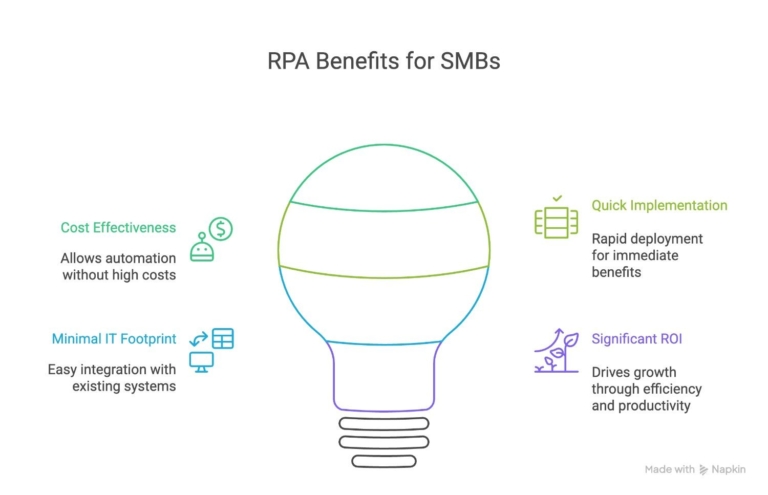Greetings! I'm Aneesh Sreedharan, CEO of 2Hats Logic Solutions. At 2Hats Logic Solutions, we are dedicated to providing technical expertise and resolving your concerns in the world of technology. Our blog page serves as a resource where we share insights and experiences, offering valuable perspectives on your queries.

RPA use cases are helping small businesses save time and money every day. If you run a small or medium business, you probably spend too much time on boring tasks like entering data, processing invoices, or updating customer information.
What if a computer could do these tasks for you?
That’s exactly what RPA does. RPA stands for Robotic Process Automation. It’s software that can do repetitive computer tasks automatically. Think of it like having a digital helper that never gets tired, never makes mistakes, and works 24/7.
Here’s what RPA can do for your business:
- Complete tasks 4-5 times faster than humans
- Work around the clock without breaks
- Reduce errors to almost zero
- Start saving you money in just a few weeks
In this guide, we’ll show you the top 5 ways businesses use Robotic Process Automation to automate their work. We’ll also cover special robotic process automation use cases for online stores and RPA use cases in e-commerce that can help your business.
What Makes RPA Perfect for SMBs?
Before diving into specific use cases, it’s important to understand why RPA is particularly well-suited for small and medium businesses:

Cost Effective
Software robots are typically 4-5 times faster than humans on the same task and work without breaks. This allows SMBs to scale operations without proportional increases in labor costs.
Quick Implementation
SMB’s will also experience a much faster time to value, as their technology stacks are usually not as complicated. Standardized systems result in much more rapid RPA bot deployments for small and medium-sized businesses, typically within 30 days or less.
Minimal IT Footprint
RPA operates “on top of” existing systems at the user-interface level, access to high-demand IT developers to build custom interface programs is not needed.
Return of Investment
Organizations experience RPA ROI performance of 30-220 percent in the first year.
Top 5 RPA Use Cases for SMBs in 2025
Take a look the use cases of robotic process automation for businesses.
1. Invoice Processing and Accounts Payable
Invoice processing is one of the most time-consuming and error-prone tasks for small businesses. Manual processing leads to delays, errors, and cash flow issues that can significantly impact SMB operations.
How RPA Transforms This Process:
- Automated Data Extraction: RPA bots can be configured to automatically process invoices when they are received. This way, you can have the software to extract the data, reconcile errors, and work out logical decisions that are required throughout the invoice processing
- Validation and Approval: Bots can validate invoice data against purchase orders and route approvals automatically
- Error Reduction: Eliminates manual data entry errors and ensures consistent processing
- Faster Payment Cycles: Accelerates the entire accounts payable process
2. Customer Data Management and CRM Updates
Customer data is the lifeblood of any SMB, but keeping CRM systems updated with accurate, current information is often neglected due to time constraints.
How RPA Transforms This Process:
- Automatic Data Synchronization: RPA can extract data from emails, chats, surveys, and other channels and upload it to the customer’s CRM profile
- Lead Management: Automatically captures and categorizes leads from multiple sources
- Customer Segmentation: Updates customer profiles based on interaction history and behavior
- Data Cleansing: Identifies and corrects duplicate or outdated customer records
3. Payroll and HR Administration
HR administrative tasks consume significant time for SMBs, often handled by non-HR specialists who juggle multiple responsibilities.
How RPA Transforms This Process:
- Payroll Automation: Bots extract timesheet data and calculate salaries to ensure accurate, timely payroll processing
- Employee Onboarding: Automates account creation, access provisioning, and documentation
- Benefits Administration: Processes enrollment changes and updates across multiple systems
- Compliance Reporting: Generates required HR reports automatically
4. Inventory Management and Supply Chain
Inventory management directly impacts cash flow and customer satisfaction. Manual tracking often leads to stockouts, overstock situations, and inaccurate records.
How RPA Transforms This Process:
- Real-Time Inventory Tracking: Bots track stock levels in real-time and send alerts to prevent shortages or overstock
- Automated Reordering: Triggers purchase orders when inventory reaches predetermined levels
- Multi-Channel Synchronization: Updates inventory across multiple sales channels simultaneously
- Supplier Communication: Automates order placement and tracking communications
RPA Use Cases in Ecommerce: For ecommerce businesses, RPA offers unique advantages:
- Product Data Management: Automatically sync product information, pricing, and descriptions across multiple marketplaces (Amazon, eBay, Shopify)
- Order Processing: Streamline order fulfillment from placement to shipping notification
- Price Monitoring: Track competitor pricing and adjust your prices automatically based on predefined rules
- Return Processing: Automate return authorizations, refund processing, and inventory updates
- Customer Review Management: Monitor and respond to customer reviews across platforms
5. Customer Service and Support
Excellent customer service is crucial for SMB success, but resource constraints often limit response times and service quality.
How RPA Transforms This Process:
- Automated Response Systems: RPA bots deliver instant answers to frequently asked customer queries, enhancing response times and overall customer satisfaction
- Ticket Routing: Automatically categorizes and routes support requests to appropriate team members
- Order Status Updates: Provides real-time updates on order and shipment status
- Knowledge Base Management: Keeps FAQ and support documentation current
Additional High-Impact RPA Use Cases for SMBs
Beyond the top 5, here are additional robotic process automation use cases that SMBs should consider:
Financial Management and Reporting
- Bank Reconciliation: Automatically match transactions and flag discrepancies
- Expense Management: Process expense reports and receipts automatically
- Financial Reporting: Generate monthly, quarterly, and annual reports with real-time data
Marketing and Lead Generation
- Social Media Management: Schedule posts, monitor engagement, and respond to common queries
- Email Marketing: Segment audiences, personalize campaigns, and track performance
- Lead Scoring: Automatically score and route leads based on predefined criteria
Compliance and Audit
- Regulatory Reporting: Generate compliance reports automatically
- Audit Trail Management: Maintain detailed logs of all automated processes
- Data Validation: Ensure data integrity across systems
E-commerce-Specific Applications
Building on our earlier discussion of RPA use cases in ecommerce, here are additional applications:
- Marketplace Management: Automatically update product listings across multiple platforms
- Shipping Optimization: Compare shipping rates and select the best options
- Customer Segmentation: Analyze purchase history and create targeted marketing campaigns
- Fraud Detection: Monitor transactions for suspicious patterns and flag for review
Key Selection Criteria for SMB RPA Implementation
When choosing which processes to automate first, SMBs should consider:
Rule-Based Processes
Ideal RPA candidates are tasks that follow clear, logical rules without the need for human judgment or decision-making.
High-Volume, Repetitive Tasks
Repetitive processes are performed frequently, such as daily, weekly, or monthly, they provide the best ROI.
Error-Prone Activities
Manual tasks are often susceptible to human errors, especially when they involve copying data, repetitive clicks, or complex forms.
Time-Consuming Processes
If an activity consumes a significant amount of employee time and adds minimal strategic value, it’s the prime candidate for RPA.
Conclusion
RPA is no longer just a buzzword, it’s a proven tool for driving efficiency, accuracy, and scalability across industries. For SMBs, the robotic process automation use cases outlined above offer the greatest potential for immediate impact and long-term value.
Don’t let your competitors gain the automation advantage. Start your RPA journey with AI Experts today. Let us by identify your most time-consuming, repetitive processes and evaluating them against the criteria outlined in this guide. The future of SMB operations is automated, and that future starts now.

Related Articles







